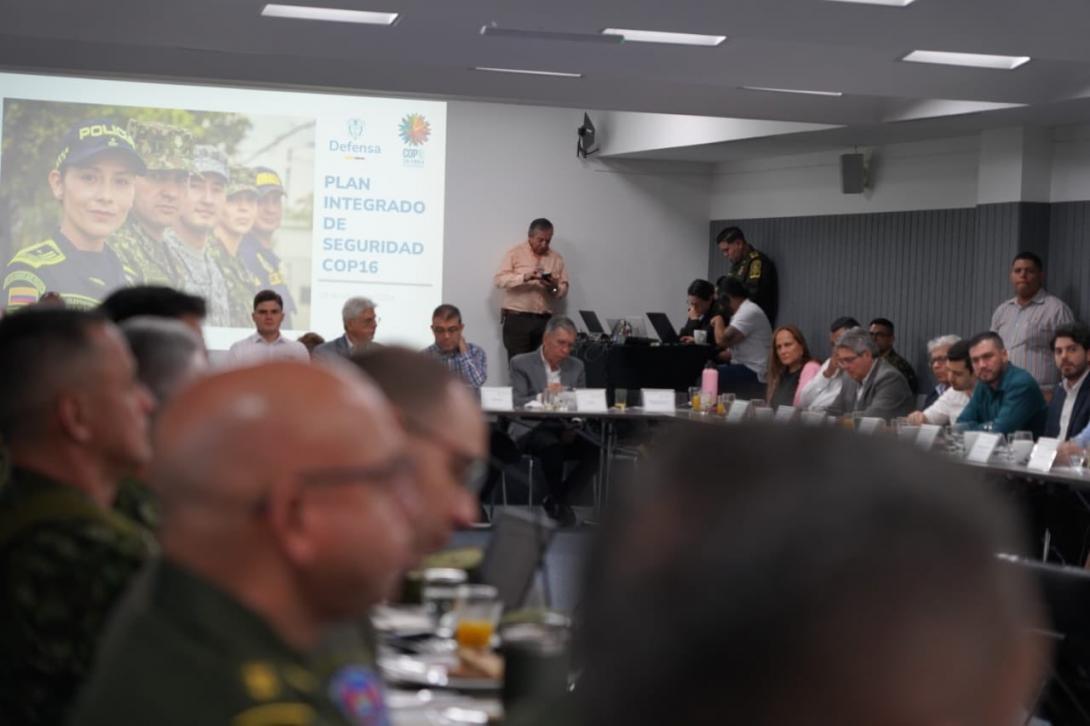During this government, 1,104 police officers have been sent to the region to reach 4,831 members of the Military Forces working for the safety and well-being of the Vallunos.
As for Colombian National Army, the Third Brigade has 4,987 members of the Military Forces and in August 512 additional specialist soldiers organized into 14 platoons arrived.
In Valle del Cauca we have reduced homicide by -2.4%, that is, 41 fewer cases and in Cali by -8.7%, with 67 fewer cases.
The Military Forces count on highly specialized teams to cover COP 16: COPES, JUNGLA, GOER prepared for crisis and negotiation; and Special Forces and Urban Operations to provide support in any eventuality that may arise.
Before the Second Commission of the Senate of the Republic reunited in Cali, the Minister of National Defense, Iván Velásquez Gómez referred first of all, not only to the work for security to face COP 16, but in the same way to the work done by the Military Forces so that inhabitants can live and feel safe in their daily lives, which is why he highlighted some of the figures that demonstrate the improvement of security in this region of the country.
“In Valle del Cauca we have reduced homicide by -2.4%, that is, 41 fewer cases and in Cali by -8.7%, with 67 fewer cases. In Jamundí the reduction is -5.6%, which means 5 fewer cases, and in Yumbo it is -18.6%. Even a municipality that has historically had high homicide rates, Buenaventura has a reduction of -36.3%, 33 fewer cases,” said Minister Velásquez.
Then, the head of the Ministry of Defense highlighted the coordination conducted by the Government, the Mayor's Office and the National Government which “has led to a different environment, we are making very positive progress and although there are challenges, the department has a very direct assistance.”
Regarding extortion as one of the crimes that generates challenges not only in this region of the country, but in the same way throughout the national territory, the head of the Ministry of Defense referred to the project for a pilot plan for the disablement of cellular equipment in prisons, presented by the ICT Minister, Mauricio Lizcano, without hitting neighboring communities.
In this line, Velásquez specifically referred to Jamundí for its proximity to Cali and the efforts that have been made to increase the security of the municipality, "with the return of Infantry Battalion No. 8 Pichincha Since the first of May of this year, we are in the same way obtaining the land for the construction of a Base in the upper part of Jamundí that will function as an advanced Command Checkpoint in charge of this Battalion.”
Therefore, since security in Jamundí is a paramount issue, the minister added that “for this reason, the 14 platoons that arrived in Valle del Cauca in August, eight are serving in this municipality, in addition to two Companies of the Urban Special Forces (BAFUR 4-7) and three added platoons: An Armored Platoon of the Cavalry Group No. 3, one of the Victors of Cartago Battalion and one of the High Mountain Battalion No. 10 in Tulua."
Regarding the COP 16 that will count on more than 11 thousand members of the Military Forces, Minister Velásquez announced that there are 3 Unified Command Posts (PMU): Blue Zone, Metropolitan Police Command of Cali and Bogota.
In the same way, “a comprehensive Security Plan was carried out by the National Police and Army with the accompaniment of the United Nations Department of Security and local authorities to work to increase the security of the event and define the cooperation mechanisms in this matter, which includes differentiated and complete security operations for the areas prepared for the Conference," Velásquez said.
In the same way, and among other measures, more than a thousand members of the Military Forces will be at strategic points in the city and on the outskirts, the Colombian Air Force is leading the Shield Plan to work for security and full control of airspace, and the National Police has already sent 12 complete teams of drones and some antidrones to support air security.
On the other hand, Velásquez referred to the issuance of Decree 1231 of 2024, which regulates the proportional and differentiated use of force in the National Police, prioritizing the protection of life and human rights. There he was emphatic in announcing that this regulation seeks to have a primacy in dialogue, a proportional use of force and instruction and transparency, that is, that there is permanent training in DD.HH.; supervision and accountability to work for the proper use of force.
“What is new there is that we include in a normative body all this that the National Police itself has been carrying out over the course of the last two years, there is a fundamental principle here: life prevails as a fundamental right, and also that in any reaction of the Police life should be taken as the main right to work for. So when some operation that breaks the normalcy of the protest occurs, the reaction must be made according to the magnitude of the disturbance,” Velásquez said.
Of the foregoing, it is clear that this Decree is not generating an immobilization or inactivity of the National Police, rather, dialogue, there the fundamental right to life and the proportional use of force are prioritized.
Source: Press – Ministry of National Defense





